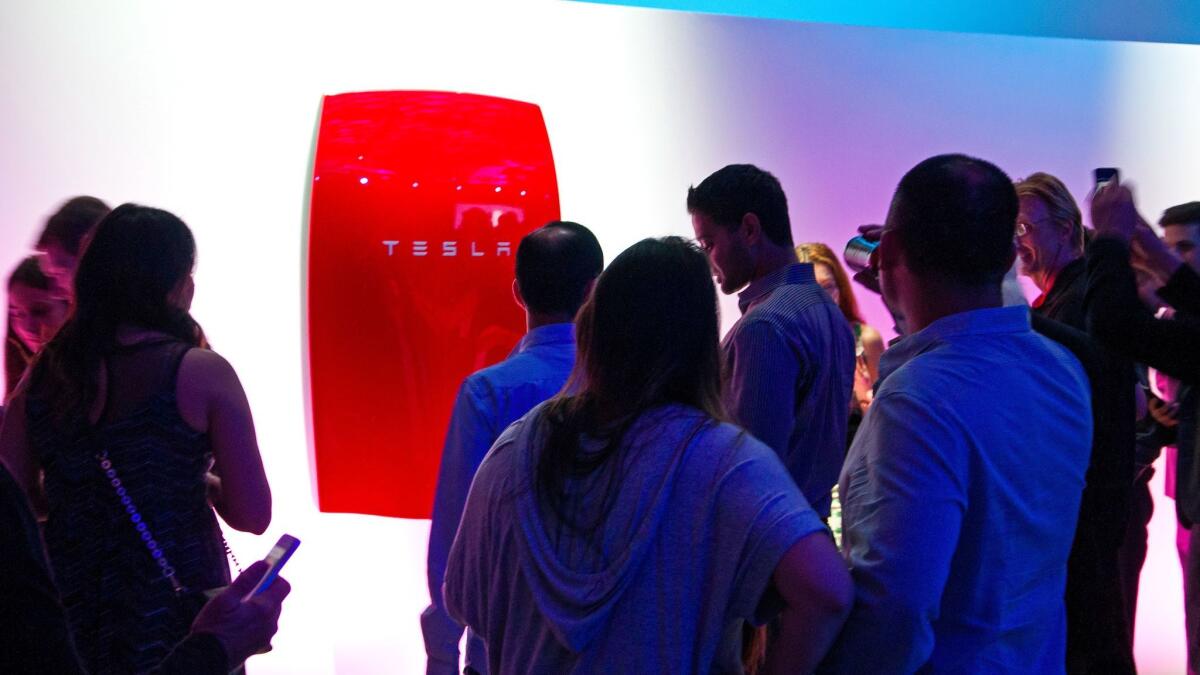Battery makers Tesla and Sonnen tout similar products but have different strategies

- Share via
Reporting from San Francisco — The two top competitors in the home energy storage market — a market that barely exists at present — are preparing for burgeoning sales in coming years as renewable energy supplies grow more common.
One name is familiar: Tesla, the electric car maker, which makes a battery called the Powerwall to store rooftop solar power at home.
The other name is Sonnen, a European company little known in the U.S. that has sold more than 15,000 lithium ion storage batteries to homes and businesses, primarily in its home country, Germany, a global leader in renewable energy.
Their products are similar but their business strategies are not.
At an energy storage conference in San Francisco on Wednesday, representatives of each company laid out the differences.
Tesla, whose merger with solar rooftop giant SolarCity is imminent, envisions a wide network of Tesla retail stores where customers can shop for an electric car, a solar roof and a battery to store excess energy for later.
“We see a convergence in a number of ways around the consumer experience,” said Mateo Jaramillo, vice president of products and programs for Tesla’s energy arm. “We obviously think a lot of that starts with the vehicle.”
Electric car customers will naturally be interested in related technologies, he said.
Sonnen, which counts General Electric as a major investor, works with contractors who install solar roofs and power supplies, and emphasizes its software systems that help customers manage home and business energy use.
As the solar rooftop business grows, “you won’t make money selling power; you’ll make money managing power,” said Philipp Schroder, Sonnen’s head of sales and marketing.
And unlike Tesla, which — in partnership with Panasonic — is making batteries that form the core of the Powerwall at a giant factory in Nevada, Sonnen will buy from suppliers.
“We don’t care where the battery is coming from, from Panasonic or anyone else,” said Schroder.
Tesla believes that having control of the battery manufacturing process will lead to lower costs and better designs.
Both see a huge market ahead. Market forecasts on power supplies vary widely, but the figures are in billions of dollars, not millions.
California state government’s goal to have 50% of electrical power generation come from renewables by 2030 will provide a big push.
“We’ll see a pretty broad swath of society” switch to solar, said Jamarillo, and that will boost sales for storage, which can be used for backup power for the household, to charge the car and to sell power back into the grid.
It’s unclear how fast that will happen.
The market has “all the makings of bubble… but it’s not a foregone conclusion that the bubble will pop,” said Shayle Kann, senior vice president at GTM Research, which hosted the conference.
The key question for the industry, he said, is whether it’s a little ahead of the curve or way ahead of the curve.
Twitter: @russ1mitchell







